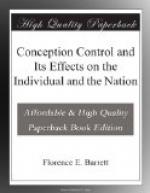This suggests that conception control can be attained without artificial methods if intercourse is confined to one week in the month.
Such control of conception, though natural, does not make it any more desirable to space the births unduly so that the children are brought up in separate units instead of in a happy family group in which they can share games and interests—but it does avoid the risks which are associated with artificial methods of conception control.
It is not proposed to discuss in detail artificial methods in this pamphlet, because no advice can be wisely given on this subject in a general way. Those who after careful consideration choose to use artificial means to prevent child-bearing will be wise if they consult their medical attendant as to those methods which are least harmful for their individual case, and ask for careful instruction in their use.
Most of the methods so widely advertised are productive of diseased conditions, whether from the nature of the method itself or from the way in which it is used, and all of those recommended to women interfere with normal physiological processes. The object aimed at in methods recommended to women, is either to produce, by drugs or otherwise, conditions in the vagina inimical to the life of the male cell, or to prevent by mechanical means the reception of the semen into the uterus. Owing to the uncertainty in the results of either of the above methods of prevention, the later editions of books which teach conception control now advocate the use of both methods at the same time in order to approximate more closely to certainty of result.
All these artificial preparations for intercourse demand from the woman an investigation of and interference with her own internal organs, which is revolting to all decent women, and such teaching is directly opposed to the advocacy of cleanliness and non-interference with the genital organs, which is the natural habit of healthy-minded women.
The effects, however, go further than this. Nature has provided in the healthy vaginal secretions an antidote to infection which quickly destroys harmful germs. If the natural secretions are altered it is difficult to restore them to their natural quality.
Professor Arthur Thomson, F.R.C.S., has shewn ("British Medical Journal,” January 7th, 1922) from observations of the lining of the womb in animals and in women that “the weight of evidence goes to prove that its function is more likely to be absorbent than excretive, and that as such it plays an important part in the animal economy.”




